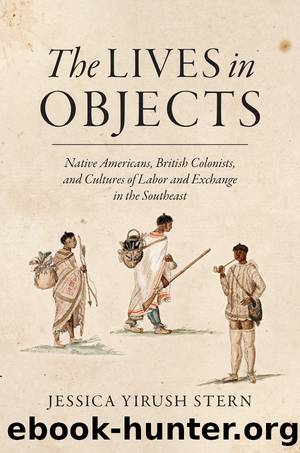The Lives in Objects by Jessica Yirush Stern

Author:Jessica Yirush Stern
Language: eng
Format: epub
Publisher: The University of North Carolina Press
FIGURE 3 Cherokee double-weave cane basket, pre-1725. The British Museum, London, England
Jones could have found many uses for the baskets at the garrison. Unlike European pots, baskets did not break, and unlike metal kettles, baskets were light. Baskets kept their form, a quality not shared by bags made of the coarse linen known as osnaburg, which planters and traders commonly used to transport rice, flour, and other foodstuffs. Still, estate inventory records indicate that only a handful of households utilized baskets.19 One such household was that of Francis Holms, who supplied clothing, beef, and sundries for the Indian trade monopoly, and died with five Indian baskets in his possession. Rather than appearing in the inventory next to the deerskins or Indian trade items, Holmsâs Indian baskets were listed with iron pots, rice sieves, and sheepshearing materials. This placement implied that he used the baskets to organize farm supplies and possibly even to hold the pounds of wool listed right below them.20
A handful of settlers died with other Indian manufactures in their estates. Thankfully for historians, court officials found it worthwhile to itemize some of these goods instead of bracketing them under âsundriesââa term that obscures the identity of numerous Southeastern Indian products. Moses Darquierâs estate included an Indian pot.21 Cherokee âcarpets,â which were large woven cane mats, were among the goods of James LeBass, as well as Mr. McKenzie and Mr. Roche.22 Thomas Bint owned an Indian lance.23 One cannot begin to calculate the number of heirlooms and exotic items that probate recorders neglected to include.24 For the most part, however, archaeological excavations support the probate inventoriesâ suggestion that settlers chose not to import Native American manufactures into their communities. Native American pottery found at excavation sites of white settlements offered some possibility of cross-cultural trade. Archaeologists contend, however, that enslaved Native Americans produced this pottery and that it was not obtained through trade.25
The individuals that one would expect to own Southeastern Indian goodsâlicensed traders and deerskin exportersâdid not.26 Except for Francis Holms, the Indian trade supplier, and James LeBass, a diplomat, the individuals who owned Native American goods at their death were not registered Indian traders or government officials. Possibly, they may have been trading clandestinely. Archaeological excavations of backcountry settlements provide little or no evidence that settlers used Native American goods, invalidating the hypothesis that individuals who lived closest to Southeastern Indians and had more access to their wares were inclined to use their manufactures.27 There are several reasons for this segregation of Native American and British material culture. The simplest explanation is that English settlers regarded their own manufactures as superior and thus saw no benefit in using anyone elseâs. Alternatively, individuals who lived on the boundaries of British society may have engaged in distinctive consumption patterns to set themselves apart from Native American neighbors who lived a little too close for comfort. A preference for English over Native American manufactures therefore derived from a desire to preserve an English identity.28 Archaeological excavations provide evidence that individuals
Download
This site does not store any files on its server. We only index and link to content provided by other sites. Please contact the content providers to delete copyright contents if any and email us, we'll remove relevant links or contents immediately.
| Civilization & Culture | Expeditions & Discoveries |
| Jewish | Maritime History & Piracy |
| Religious | Slavery & Emancipation |
| Women in History |
Cecilia; Or, Memoirs of an Heiress — Volume 1 by Fanny Burney(32536)
Cecilia; Or, Memoirs of an Heiress — Volume 2 by Fanny Burney(31934)
Cecilia; Or, Memoirs of an Heiress — Volume 3 by Fanny Burney(31925)
The Secret History by Donna Tartt(19023)
Sapiens: A Brief History of Humankind by Yuval Noah Harari(14358)
Leonardo da Vinci by Walter Isaacson(13304)
The Radium Girls by Kate Moore(12012)
Sapiens by Yuval Noah Harari(5363)
How Democracies Die by Steven Levitsky & Daniel Ziblatt(5209)
The Wind in My Hair by Masih Alinejad(5085)
Homo Deus: A Brief History of Tomorrow by Yuval Noah Harari(4896)
Endurance: Shackleton's Incredible Voyage by Alfred Lansing(4749)
Man's Search for Meaning by Viktor Frankl(4568)
The Silk Roads by Peter Frankopan(4522)
Millionaire: The Philanderer, Gambler, and Duelist Who Invented Modern Finance by Janet Gleeson(4457)
The Rape of Nanking by Iris Chang(4194)
Joan of Arc by Mary Gordon(4091)
The Motorcycle Diaries by Ernesto Che Guevara(4081)
Stalin by Stephen Kotkin(3953)
